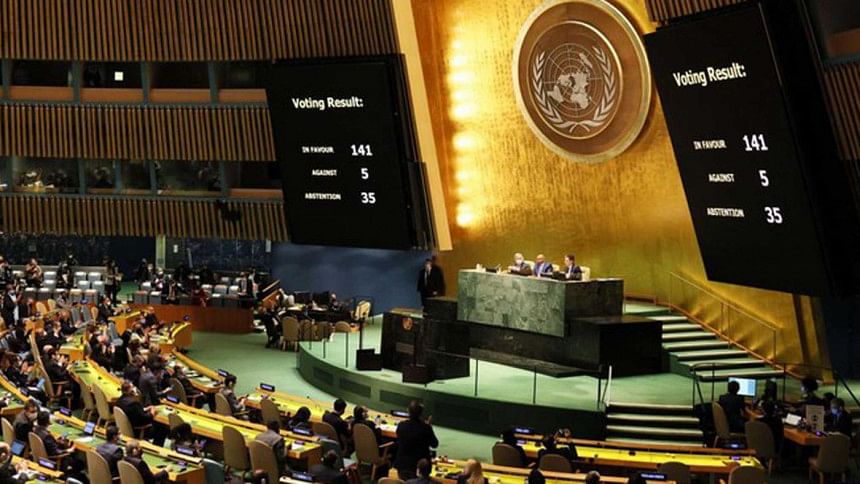Why Bangladesh’s abstention from the UN resolution on the Ukraine war is justified

The UN General Assembly emergency session adopted a resolution against Russia's aggression in Ukraine on 2 March 2022. It was adopted by 141 votes of total 193 members with 5 negative votes and 35 abstentions of which Bangladesh was one. Given the highly polarised geopolitical orientation of current international relations and UN operational narratives, this write-up argues that the pragmatic decision of Bangladesh was justified.
The resolution reprimands Russia (para 2), demands 'immediate, complete and unconditionally' withdraw from Ukraine (para 4), and deplores Russia's recognition of Donetsk and Luhansk regions of Ukraine as 'inconsistent with the principles of the UN Charter' (para 5). Its text is long with 18 preamble-proclamations and 16 paragraphs, censoring Russia as an aggressor which appears intuitively appealing due to Russia's transgression. But the Ukraine war is not all about Russian aggression. The western allies of Ukraine have been supplying massive arms and ammunitions, imposing successive economic and financial sanctions, and confiscating private properties and bank accounts of Russian citizens. If Russia withdraws from Ukraine in compliance with the resolution, would western military support be discontinued, economic and financial strangulation be lifted, and seized property be returned? The resolution is totally silent on these issues. The West can continue these measures even following Russian withdrawal as happened after 16 January 2016 when the International Atomic Energy Agency verified that Iran has completed the necessary steps under the Iran nuclear deal that ensures Iran's nuclear program is and remains exclusively peaceful. Yet the US lifted only nuclear-related sanctions and continued other sanctions including economic. Half of the seized Afghan reserve in the US is allocated as compensation to US nationals victims of the 9/11 attack when millions of Afghans are destitute and starving to death.
The western arms supply to Ukraine constitutes a violation of international neutrality law and the supplying states become parties to the war justifying countermeasures by Russia. Even though Ukraine is the victim of an unlawful attack, the principle of neutrality requires third states to remain neutral regardless of the cause or illegality of the attack (Fleck, Handbook of International Humanitarian Law, 2021: 603-12; Max Planck Encyclopedia of Public International Law 2015, para 36; 1907 Hague Convention XIII, Art 6). Arms shipments to Ukraine may be regarded as the complicity in the war and subject to countermeasures. However, collective self-defence under Article 51 of the UN Charter entitles Ukraine to seek and receive military support from its western allies. Can this rearmament of Ukraine be continued after the hostility is over? The resolution provides no answer.
National security concern has been a common vocabulary in interstate relations. The 1962 Cuban missile crisis caused by American deployments of ballistic missiles in Italy and Turkey and matched by the same deployments in Cuba by the Soviet; and Israel and its western allies' resistance to Iran's nuclear programme are all about security concerns. Australia has been campaigning against Chinese interference in its national security. The resolution fails to realistically address Russia's security concern after Ukraine's NATO membership, the central issue in this war, which had the potential of defusing the tension.
There are also issues of double standard, discrimination, and exceptionalism. Foreign nationals are allowed to enter Ukraine to fight Russian troops, Ukrainian civilians are armed, and women are making firebombs. Western media have cheered and praised these acts as valiant display of heroism determined to resist Russian troops. By contrast, western media never called the Iraqis resisting US invasion in 2003 heroes; Palestinians fighting against Israeli occupation of their land for decades are branded terrorists; and Yemeni civilians resisting Saudi bombing in Yemen using the British and American planes and bombs are not heroes but puppets of Iran. Putin is held guilty of war crimes by western media, which never held their leaders for committing war crimes in Iraq, Libya, and Afghanistan. While Ukrainian refugees are welcome in European countries, coloured people fleeing the Ukraine war are reportedly discriminated against (Daily Star 8&12/3/2022; Al-Jazeera 2&5/3/2022). Surely Ukrainian refugees deserve coverage and compassion for their plight, which non-Ukrainian refugees deserve too. Western media convey the message that war only happens in non-white and non-European impoverished third world countries unlike Ukraine being 'relatively civilized' sitting 'in the heart of Europe' (Al-Jazeera 1/3/2022 quoting western news clips). These double standards expose western media bias for western exceptionalism with racist undertones and overtones.
Western media usually toe to their government line in non-western conflicts and become lobbyists for their government position through fake, deceptive, fabricated, and manufactured news. They reported Iraqi troops ripped Kuwaiti babies from incubators after the 1990 Kuwait invasion. A 15-year Kuwaiti girl, named 'nurse Nayirah' by western media, testified to the US Congress that she witnessed the murder of infant children by Iraqi soldiers in Kuwait. Nayirah was not a 'nurse' but the daughter of Kuwaiti Ambassador to the US ('Deception on Capitol Hill' New York Times, 15/1/1992, https://www.nytimes.com/1992/01/15/opinion/deception-on-capitol-hill.html). Western media propaganda of the existence of WMDs in Iraq and Saddam's collusion with Al-Qaida in the 9/11 attack accelerated the Iraq invasion. Amnesty International (AI) and western media claimed that Gaddafi used Black Mercenaries and rape as weapon to pacify civil unrest in 2011 but AI itself found no evidence for the claim after the NATO invasion of Libya (Cockburn, 'Amnesty Questions Claim that Gaddafi Ordered Rape as Weapon of War' Independent, 24/6/2011 <https://www.independent.co.uk/news/world/africa/amnesty-questions-claim-that-gaddafi-ordered-rape-as-weapon-of-war-2302037.html).
Human Rights Watch teamed up with western media pursued regime change in Syria and turned a blind eye to the US, UK, and French role in waging a proxy war by arming insurgent groups in Syria. Contrary to the claim that human rights NGOs don't accept funding from governments, AI received millions of dollars from the US, UK, Dutch governments and European Commission during 2007-2010, compromising impartiality and credibility ('Breaking its Own Rules: Amnesty's Researcher Bias and Govt Funding' NGO Monitor 4/6/2012, https://www.ngomonitor.org/reports/breaking_its_own_rules_amnesty_s_gov_t_funding_and_researcher_bias/). While there is tangible evidence of destruction and human miseries in Ukraine, the veracity of western media narratives may not always be taken for granted.
Nothing condones Russia's invasion of Ukraine. This war represents the cold-war style bloc-power rivalries in which one is as interventionist and violative of international law as the other. Supporting either side means endorsing one over the other, rendering abstention preferred. The resolution, being non-binding, provides no comprehensive framework for ending the war by addressing all war-related issues in a bipartisan way. It echoes partisanism, skewing in favour of the West and fails to strike a pragmatic balance between the competing interests, casting a bleak prospect of ending the war. The reason for this failure lies not in the UN itself but in its west-centric domination. Unless the UN becomes more universal and less west-centric, the success of its peace initiatives in the Ukraine war and similar future crises will remain elusive.
The author is Emeritus Professor of Law at Macquarie University, Sydney, Australia.

 For all latest news, follow The Daily Star's Google News channel.
For all latest news, follow The Daily Star's Google News channel. 



Comments